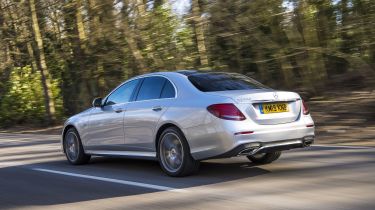BMW 530e vs Mercedes E 300 e: running costs and warranty
For private buyers, the BMW is available for significantly less per month on finance

These cars have very similar list prices, but there’s a bigger disparity in monthly costs, whether you’re buying on a PCP (Personal Contract Plan) as a private buyer or leasing as a business, with the BMW undercutting the Mercedes by a big chunk.
Go for a three-year/30,000 mile PCP after a £7,000 deposit and shockingly you’ll save more than £200 a month with 530e M Sport, which comes in at around £532 compared to £750 for the Mercedes.
Business leases are also quite different and stacked heavily in the BMW’s favour if you lease directly through the manufacturer, but there are plenty of third-party companies offering more competitive costs.
We found a number of deals for the BMW at £400 a month and under, while the Mercedes comes in at around £450, again assuming a 30,000-mile/36-month contract with six months' rental up-front.
As of April 2020, company-car tax drops drastically for plug-in hybrids, so even a higher-rate taxpayer forks out just £2,403 or £2,399 a year for the BMW or Mercedes respectively.
The Mercedes does claw back some points against the BMW in other monetary areas. It’s cheaper to insure, sitting in group 33 compared to group 37, and is also set to hold its value better. According to CAP’s residual forecast, after three years and 36,000 miles, the E 300 e will be worth £22,288, as opposed to £20,424 for the BMW.
BMW also lags behind on warranty cover. Both manufacturers offer three-year/unlimited-mileage guarantees on their cars, but Mercedes covers the batteries in its plug-in hybrids for eight years or 100,000 miles, while BMW only stretches to six years or 60,000 miles.


